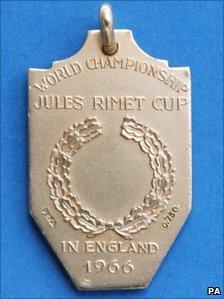England World Cup winner Nobby Stiles sells medal
- Published
The former Manchester United and England footballer Nobby Stiles is to sell the medal he received when England won the World Cup in 1966.
The 68-year-old is offering memorabilia from his career for auction so his family can benefit from their sale.
The 45 lots are expected to fetch hundreds of thousands of pounds when they go under the hammer in October.
Also in the collection is his 1966 World Cup cap and his 1968 European Cup winner's medal.
The blue Manchester United shirt he wore in the European Cup final against Benfica is also up for sale, as is Alan Ball's 1966 World Cup final shirt, which Stiles acquired from his team-mate as a swap after the match.
The World Cup medal is expected to sell for between £100,000 and £150,000 and some of the other items are estimated to fetch up to £30,000.

The medal is expected to fetch between £100,000 to £150,000
Born Norbert Peter Stiles in Collyhurst, Manchester, in 1942, he was awarded the MBE in 2000 for his part in England's 4-2 victory over West Germany on 30 July 1966.
The midfielder and Old Trafford legend won two league titles and a European Cup during an 11-year career with Manchester United.
Stiles, who suffered a stroke in June, said: "It was always my intention to leave the entire collection to my children.
"But I have three sons - how do you fairly divide up this sort of collection between them?
"They have each selected some pieces they would like to keep for themselves."
He added: "I'm as patriotic as the next Englishman and will always cherish my memories and the friendships I made in my playing days, but at this stage of my life I would rather have some control over the distribution of my memorabilia and know that my family will benefit."
David Convery, from Convery Auctions, said: "The Nobby Stiles Collection represents English football's greatest period in both the domestic and European arena.
"We anticipate worldwide interest in this important collection, particularly for his World Cup and European memorabilia."
The sale will take place at the Royal Highland Centre in Edinburgh on 27 October, and the collection will be on view from 25 October.
- Published18 June 2010